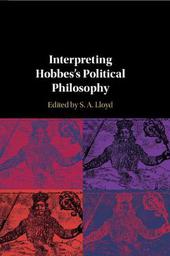
|
Interpreting Hobbes's Political Philosophy
Paperback / softback
Main Details
| Title |
Interpreting Hobbes's Political Philosophy
|
| Authors and Contributors |
Edited by S. A. Lloyd
|
| Physical Properties |
| Format:Paperback / softback | | Pages:291 | | Dimensions(mm): Height 227,Width 151 |
|
| Category/Genre | Western philosophy - c 1600 to c 1900
Social and political philosophy |
|---|
| ISBN/Barcode |
9781108401708
|
| Classifications | Dewey:320.01 |
|---|
| Audience | | Professional & Vocational | |
|---|
| Illustrations |
Worked examples or Exercises
|
|
Publishing Details |
| Publisher |
Cambridge University Press
|
| Imprint |
Cambridge University Press
|
| Publication Date |
25 March 2021 |
| Publication Country |
United Kingdom
|
Description
The essays in this volume provide a state-of-the-art overview of the central elements of Hobbes's political philosophy and the ways in which they can be interpreted. The volume's contributors offer their own interpretations of Hobbes's philosophical method, his materialism, his psychological theory and moral theory, and his views on benevolence, law and civil liberties, religion, and women. Hobbes's ideas of authorization and representation, his use of the 'state of nature', and his reply to the unjust 'Foole' are also critically analyzed. The essays will help readers to orient themselves in the complex scholarly literature while also offering groundbreaking arguments and innovative interpretations. The volume as a whole will facilitate new insights into Hobbes's political theory, enabling readers to consider key elements of his thought from multiple perspectives and to select and combine them to form their own interpretations of his political philosophy.
Author Biography
S. A. Lloyd is Professor of Philosophy and Law at the University of Southern California. She is the author of Ideals as Interests in Hobbes's 'Leviathan' (Cambridge, 1992) and Morality in the Philosophy of Thomas Hobbes (Cambridge, 2009), and the editor of The Bloomsbury Companion to Hobbes (2012) and Hobbes Today (Cambridge, 2013).
Reviews'This book makes a valuable contribution to the literature on Thomas Hobbes ... it is a welcome addition to the literature on Hobbes.' Marcus P. Adams, Hobbes Studies
|